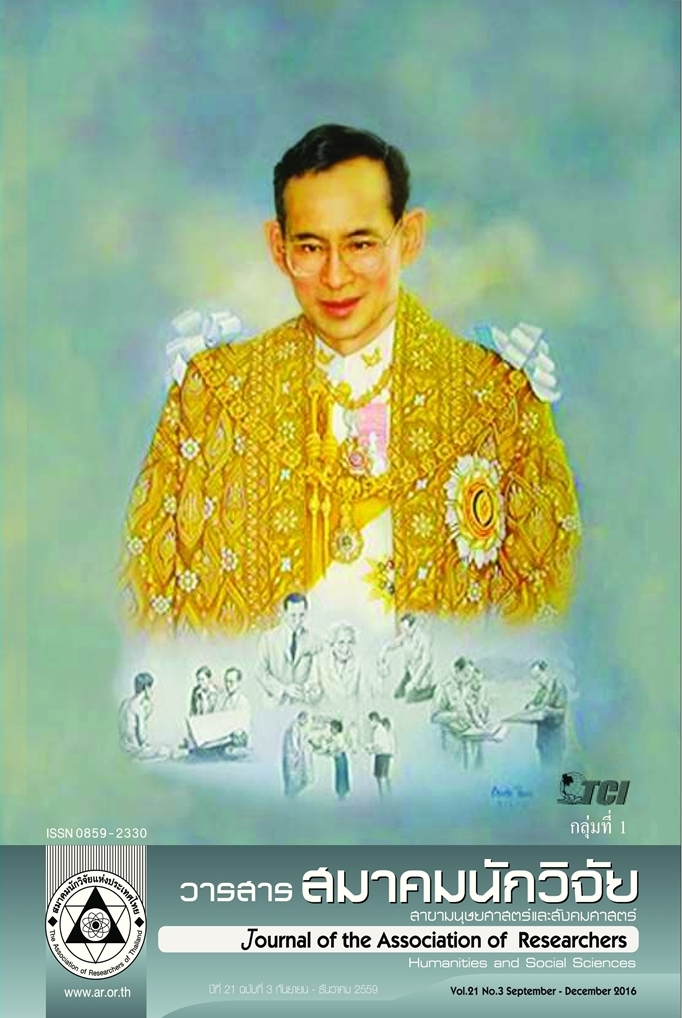Innovation of Democracy Reform Model under the Sovereign Governance of Four Balancing Powers in Thailand
Main Article Content
Abstract
Before the Siamese revolution in 1932, the Supreme Council of State was established by H.M. King Prajadhipok (RAMA VII) in 1925 as holistic policy and legislative advisory council of all State affairs in order to well prepare carefully a peaceful transformation from the regime of absolute monarchy into constitutional monarchy. This Siamese monarch heritage of Dharmaraja governance has inspired and enlightened the researcher to study in searching for the renaissance of the Supreme Council of State as a new model of democracy reform innovation based upon the sovereign governance of balancing four pillars of State powers. Among many countries around the world, Thailand had long been faced with tremendous problems of representative democracy in the application of the British model of Westminster parliamentary system since 1932. As there are today at least four principal models of representative democracy: British parliamentary system, American presidential system, French semi-presidential system, and German applied parliamentary system. The purpose of this research therefore is to find out an innovation of the fifth model called “Dhrammacracy semi-parliamentary system”, in which the separation of sovereign powers shall be based on balancing four State powers pillars: sovereign governance of the Supreme Council of State, legislative power of the Parliament, executive power of the Government, and judicial power of the Courts. This research applied thus a qualitative research methodology by documentary research and case study research methods for data collection and data analysis leading to the conclusion and recommendations of the research. The results of this research found that the innovation of democracy reform model of “Dhrammacracy semi-parliamentary system” shall be applied not only in Thailand, but also in any countries that faced with tremendous problems of majoritarian dictatorship of Parliament after the adoption of British model of Westminster parliamentary system. This research paper is a part of research report entitled “Thai Democracy Reform under the Framework of Draft Dhrammacracy Constitution”, with the supporting fund of Research Institute of Rangsit University in Thailand.
Article Details
บทความที่ปรากฏในวารสารนี้ เป็นความรับผิดชอบของผู้เขียน ซึ่งสมาคมนักวิจัยไม่จำเป็นต้องเห็นด้วยเสมอไป การนำเสนอผลงานวิจัยและบทความในวารสารนี้ไปเผยแพร่สามารถกระทำได้ โดยระบุแหล่งอ้างอิงจาก "วารสารสมาคมนักวิจัย"
References
Borwonsak Uwanno. (1995). Research Report on the Investigation System of High Ranking Politician’s Corruption. Bangkok: Kredthai Co, Ltd.
Bringham, Tom. (2011). The Rule of Law. Winner of the Orwell Prize for Best Political Book 2011. London: Penguin Books.
Buddhadasa Bhikkhu. (2006). Dharma and Politics. Bangkok: Amorn Publishing.
Chaianant Samutvanich. (1976). Politics-Political Changes in Thailand during B.E. 2411-2475. Bangkok: Faculty of Political Science, Chulalongkorn University.
Chanchai Rattanavibul. (2005). The Roles of the Supreme Council of State during the reign of King Prajadhipok. A thesis of Master of Education, Srinakarintraviroj University, printed by King Prajadhipok Museum, King Prajadhipok Institute. Bangkok: Chulalongkorn University Printing.
Chaowana Traimas. (2003). “The Constitution and New Politics Design”, in Thai Constitutional Court in the Political Reform Situation. Bangkok: P. Press Co., Ltd.
Chongkhachan Suwanmanee. (2011). “Supreme Council of State of Siam”, in Wikipedia, the Free Encyclopedia: www.kpi.ac.th/wiki/index.php?title/อภิรัฐมนตรีสภา.
Phra Brahmagunabhorn (P.A. Payutto). (2010). Dictionary of Buddhism. Nonthaburi: S.R. Printing Mass Products, Co. Ltd.
____________ (2006). Dhrammacracy Not Come, Democracy Not Found: Political Science and Legal Science Matching (2nd Edition). Bangkok: Buddha Dharma Foundation Publishing.
Pramoj Nakornthap. (2010). “If the Prime Minister understands rajprachasamasai, no need to wait for reforming”, in Manager Online: www.manager.co.th/Daily/ViewNews.aspx? . 11 July 2010.
Pridi Kasemsap.(1987). Tripracha Doctrine and Five Powers Constitution of Dr. Sun Yat-Sen. Bangkok: Thai Wattanapanich Publishing.
Saunders, Cheryl and Hassall Graham, Editors. (1997). Asia-Pacific Constitutional Yearbook 1995. Centre for Comparative Constitutional Studies, University of Melbourne, Australia.
Sombat Dhamrongtanyawongse. (2006). Thai Politics and Government: B.E. 1219-1957. Bangkok: Semadharm.
Sonthi Taechanand. (2002). Political Development Plan on Democracy Regime under the Initiative of King Prajadhipok (B.E.2499-2475). Bangkok: King Prajadhipok Institute.


